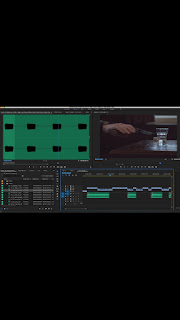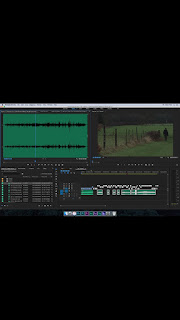Film editing is
part of the creative post-production
process of filmmaking. The term
film editing is derived from the traditional process of working with film, but now it
increasingly involves the use of digital technology. The film
editor works with the raw footage, selecting shots and
combining them into sequences
to create a finished motion picture.
to create a finished motion picture.
Me and my group have been working on editing our opening
sequence to a thriller over the past few weeks and have had to make some key
decisions on the way. One of the key decisions that I had to make in the
process of editing is that I had to find all of the best shots that we filmed
on our shoot day. This was very important to do as it meant that we would have
no accidental shots in our scene where there is something that we don’t want in
the background or if one of the actors were to look at the camera there was an
exception of this in one split second of our thriller which I purposely added
in as I think that it would create a good effect on the sequence if one of the
characters were to look at the camera just before he was shot.
 Another area that I feel made many of the key decisions
was in what order the shots should be put. I came up a lot in my free time to
see if I could find a better ways of putting the sequence together to make it
flow much more easily and make it easier for the audience to understand.
Another area that I feel made many of the key decisions
was in what order the shots should be put. I came up a lot in my free time to
see if I could find a better ways of putting the sequence together to make it
flow much more easily and make it easier for the audience to understand.
Finally one other aspect that I feel I had a large part
in influencing in our thriller was in the organizing the sound in the scene. I
selected many of the sound effects that we have put into the sequence from a
copy right free source. I felt that I had a large part in working on this as I
found many of the sounds after looking at the completed footage and figuring
out what kind of sounds we needed at a certain time. I feel that this was
especially important in ours as we in our thriller the sound when filming
didn’t record so we are having to do both voiceovers and all of the sound
including the background noises such as the wind and animals.
There were many expectations in the run up to the editing
including that my group and I would create a realistic and engaging piece. My
group expected me to be doing much of putting the clips together and making
sure that they ran smoothly.
In the
process of editing our thriller we only cropped a small part of the clip and
added to the same footage but a little earlier on. We did this to show the
action of the two characters as before one of the characters had stopped acting
whilst the other wasn’t doing anything that bought any interest so instead we
split what the screen would show straight down the middle so we got the best
two parts of the same clip but instead put together at the same time.
We also
used to tool such as the razor tool to make sure that the shot transitions were
in exactly the right place at that certain time to make the sequence run more
smoothly and improve the continuity.
The
timeline also helped us to create continuity in many ways. Firstly, we were
able to do this through making sure that all of the shots that we needed were
organised into areas that were similar to the other shots such as all of the
shots of Fran (our main actress) were all organised into one place so that we
could access them quickly. We would then get all of the shots that we needed
and put them into the order that we thought was best to make sure that our film
made sense and ran smoothly.
We had to
crop one of the shots in the sequence. One part on the inside of the house
there was a moment when the secretary and the bodyguard weren’t quite in sync
as one of them stopped acting before the other. So, we cut the screen in half to
make sure that we were able to get the action of both of the actors to make the
scene even more exciting.
After
having put all the shots together I made many key decisions to ensure that the
piece would work. It was one of my jobs to ensure that there were no mistakes
such as the actors looking at the camera or that there were no extended periods
of time where there was nothing happening and to try and make the sequence
short enough to work so that it would fit into the time specifications.
We used
many layers in the making of our film. Firstly, we used 2 layers for the visual
side of the editing as we wanted to be able to distinguish between the shots so
different shots would be on different layers so we could see clearly when the
transitions were. This would also mean that they would not overlap. We also
used one layer to add the title cards that we used in the sequence. Finally,
for the sound we used five layers. We used so many as the sound of our piece didn’t
record on the day so we had to instead add all the ambient sound which took up
two layers on each of the shots and all of the sound effects to make it work which
also took up two layers. Finally, we needed one more layer to make sure that we
had the soundtrack in the sequence.
The sound
in the sequence we used a non-copyrighted sound track and many of the sound
effects that the school provided and we were making few of the sounds ourselves
such as the walking in the woods we thought that we should have made this
ourselves as it was difficult to get the timing right.
We added
the titles with the names at the start of the sequence but we left the name of
the actual film to the end as we didn’t think that it would work as well if we
were to have it within the names.
We were
able to match the action in three areas in the film which made it slightly more
difficult for us. We did this firstly by when the woman looks away at the start
we then cut to the room hopefully showing that she has perhaps just seen the room
or the house that she was going to shoot at. We also did this with the men
inside to show that they talking to each other by alternating shots between the
men. We were finally able to show this through the eye line match when the
woman was looking through the scope to then see what she is seeing through the
cross hairs that we would then put on the screen.
We used
sound to help to engage the audience in a few ways. Firstly, our soundtrack was
designed to make sure that tension was created in the scene. We also made the
first gun shot in the scene very loud to shock the audience and engage them
further.
We only
used the sound effects of the gun to make the scene seem more realistic and to
create a diegesis in this opening sequence.








0 comments:
Post a Comment